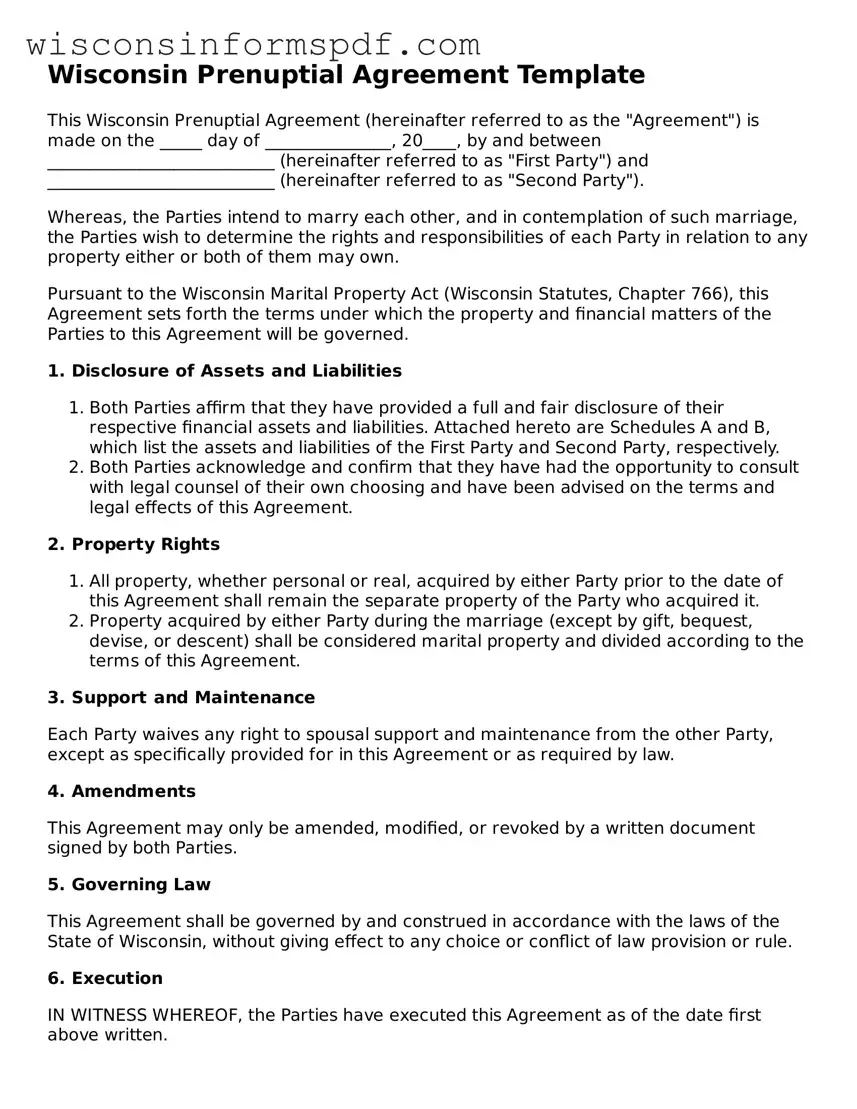What is a Prenuptial Agreement in Wisconsin?
A prenuptial agreement in Wisconsin is a legal document signed by two people before they get married. This contract outlines how assets, debts, and financial matters should be handled during the marriage or in the event of divorce or death of one of the partners. It's designed to provide clarity and protect both parties' financial interests.
Is a Prenuptial Agreement legally binding in Wisconsin?
Yes, in Wisconsin, a prenuptial agreement is legally binding if it meets all the legal requirements set forth by the state. These requirements include full disclosure of assets by both parties, signing the agreement without coercion, and ensuring that the terms are not unconscionable. It's recommended to have the agreement reviewed by separate attorneys for each party.
Can a Prenuptial Agreement be modified or revoked after it's been signed?
Yes, a prenuptial agreement can be modified or revoked after it's been signed, but this can only happen if both parties agree to the changes. Any modifications or the decision to revoke the agreement must be done in writing and signed by both parties, similar to the original agreement.
What should be included in a Wisconsin Prenuptial Agreement?
A Wisconsin Prenuptial Agreement typically includes provisions for the division of property and debts, alimony or spousal support, and the rights and obligations of each party during and after the marriage. It might also cover matters related to estate planning and inheritance, but it cannot adversely affect child support obligations.
Do we need lawyers to create a Prenuptial Agreement in Wisconsin?
While Wisconsin law does not require each party to have a lawyer to create a prenuptial agreement, it is highly advisable. Having independent legal counsel ensures that both parties fully understand the terms of the agreement and that their rights are protected. An attorney can also confirm that the agreement complies with Wisconsin law and is likely to be enforced.
What happens if we don't have a Prenuptial Agreement in Wisconsin?
Without a prenuptial agreement, your marital assets and debts will be subject to Wisconsin's marital property laws in the event of a divorce. Wisconsin is a community property state, meaning that all marital property is divided equally among both parties, regardless of who earned it or whose name is on the title.
How can a Prenuptial Agreement affect alimony in Wisconsin?
A prenuptial agreement can specify whether one party is entitled to alimony in the event of a divorce and the terms of such support. However, the terms must not leave the other party with insufficient resources to support themselves and should not be unconscionable at the time of the divorce.
Can a Prenuptial Agreement cover child custody and support in Wisconsin?
While a prenuptial agreement can include terms about child custody and support, the court has the final say in these matters. Courts will always prioritize the best interests of the child over any agreement between parents. Therefore, any provisions related to children are subject to review and can be modified by the court.
What makes a Prenuptial Agreement invalid in Wisconsin?
A Prenuptial Agreement in Wisconsin may be considered invalid if it was signed under coercion or duress, if there was fraud involved in its execution (such as hiding assets), if it's unconscionable, or if it fails to meet legal formalities, such as not being in writing or improperly witnessed. Additionally, an agreement might be invalid if one party did not have the opportunity to consult with independent legal counsel.

